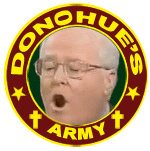March 29, 2007 The San Diego Union- Tribune
By Elizabeth Holtzman and Cynthia L. Cooper
The stealth dismissal of U.S. attorneys by the Bush administration carries echoes of the Nixon administration firing special prosecutor Archibald Cox in 1973. Now, as then, we may be witnessing criminal acts of obstruction of justice at the highest levels of government. If left to fester, they will poison our system.
Cox was investigating White House misdeeds when Nixon told Attorney General Elliot Richardson to fire him. Richardson refused and resigned, as did Deputy Attorney General William Ruckelshaus. Third-in-charge, Robert Bork, complied, and the “Saturday Night Massacre,” as it was called, came to epitomize an imperial administration, acting above the law and using its power to interfere with legitimate processes of justice.
Outrage among the American people triggered the impeachment inquiry against Nixon and his eventual resignation.
In the current U.S. attorney massacre, the public outrage and the line of inquiry invited by these events feel eerily familiar: Why were these eight U.S. attorneys ousted? Why did the Justice Department misrepresent the reasons for the firings? Why were political aide Karl Rove and other top administration advisers involved in the decisions of whom to fire? Why is Attorney General Alberto Gonzales' aide who helped coordinate the firings, Monica Goodling, invoking the Fifth Amendment to avoid testifying before Congress? And what did the president know and when did he know it?
So far the press and Congress have followed evidence of two patterns of firing – for refusing to smear enemies and refusing to protect friends. Fired prosecutors David Iglesias of New Mexico and John McKay of Washington would not pursue criminal voter fraud charges against political opponents in the way the administration wanted. Fired U.S. Attorney Carol Lam of San Diego had prosecuted and was investigating Republicans.
Removal of Frederick A. Black in Guam immediately after he began investigating lobbyist Jack Abramoff, a Bush friend, may be been a precursor to this.
A third firing pattern may exist: using firings to influence election outcomes.
E-mails suggest political strategist Rove's involvement. Rove's job is helping his wing of the GOP win future campaigns. What does that have to do with firing judicial appointees?
Consider the districts they served in: Arkansas, site of Hillary Clinton's first steps into politics as the state's first lady; San Francisco, Democratic House Majority Leader Nancy Pelosi's district; Nevada, Democratic Senate Majority Leader Harry Reid's state; New Mexico, presidential candidate Bill Richardson's state. North Carolina, home of former senator and presidential hopeful John Edwards, was considered but passed over by the Bush administration's ax.
Arizona, where U.S. Attorney Paul Charleton, with a particular reputation for excellence, was fired, is home to presidential candidate and sometime Bush critic John McCain. Michigan, where the prosecutor was inexplicably fired, is home to chairman of the Senate Armed Services Committee and a staunch Iraq war opponent, Carl Levin (up for re-election in 2008). Arizona and Michigan are both important swing states, where vote suppression or trumped up charges could tip the balance in an election.
Let's get to the bottom of this. Congress has many tough questions for Rove and others that need asking and answering now. How were the ousted prosecutors selected? What do the reported 16 to 18 days of missing e-mails say?
President Nixon's office managed to erase audiotapes with key evidence, which became one of the grounds for his impeachment. The current missing e-mails may present the same obstruction of justice.
The president must be questioned, too, along the same precise lines as in Watergate: What did he know, and when did he know it?
Federal prosecutors have extensive powers and substantial budgets. We need them to investigate mob racketeering, terrorists (homegrown and international), human trafficking, market manipulations, government fraud, environmental crimes, violations of civil liberties and other criminal activities. Deploying them to conduct witch-hunts of politicians of opposing views or to suppress votes is a blatant misuse of their important power.
If Rove or President Bush tried to do this, it is they who need firing. A president must uphold the law, not to subvert it for political or partisan ends. As we learned in Watergate, our Constitution and our shared values are more important than any single officeholder.
* * * *
 Holtzman, former prosecutor and member of Congress who served on the House Judiciary Committee during the Nixon impeachment proceedings, and Cooper an attorney, are co-authors of “The Impeachment of George W. Bush” (Nation Books, 2006).
Holtzman, former prosecutor and member of Congress who served on the House Judiciary Committee during the Nixon impeachment proceedings, and Cooper an attorney, are co-authors of “The Impeachment of George W. Bush” (Nation Books, 2006).
Tags: Karl Rove President Bush impeachment
 While I'm glad you won your battle against the artist who created the naked chocolate Jesus, I don't totally agree with your reasons for taking him on. I'm not at all offended that the artist planned to shoot creamy nougat out of Our Saviours wounds or that he planned to serve Our Lord's fine chocolate flesh to the public--it's kind of what communion is all about, isn't it?
While I'm glad you won your battle against the artist who created the naked chocolate Jesus, I don't totally agree with your reasons for taking him on. I'm not at all offended that the artist planned to shoot creamy nougat out of Our Saviours wounds or that he planned to serve Our Lord's fine chocolate flesh to the public--it's kind of what communion is all about, isn't it? 


